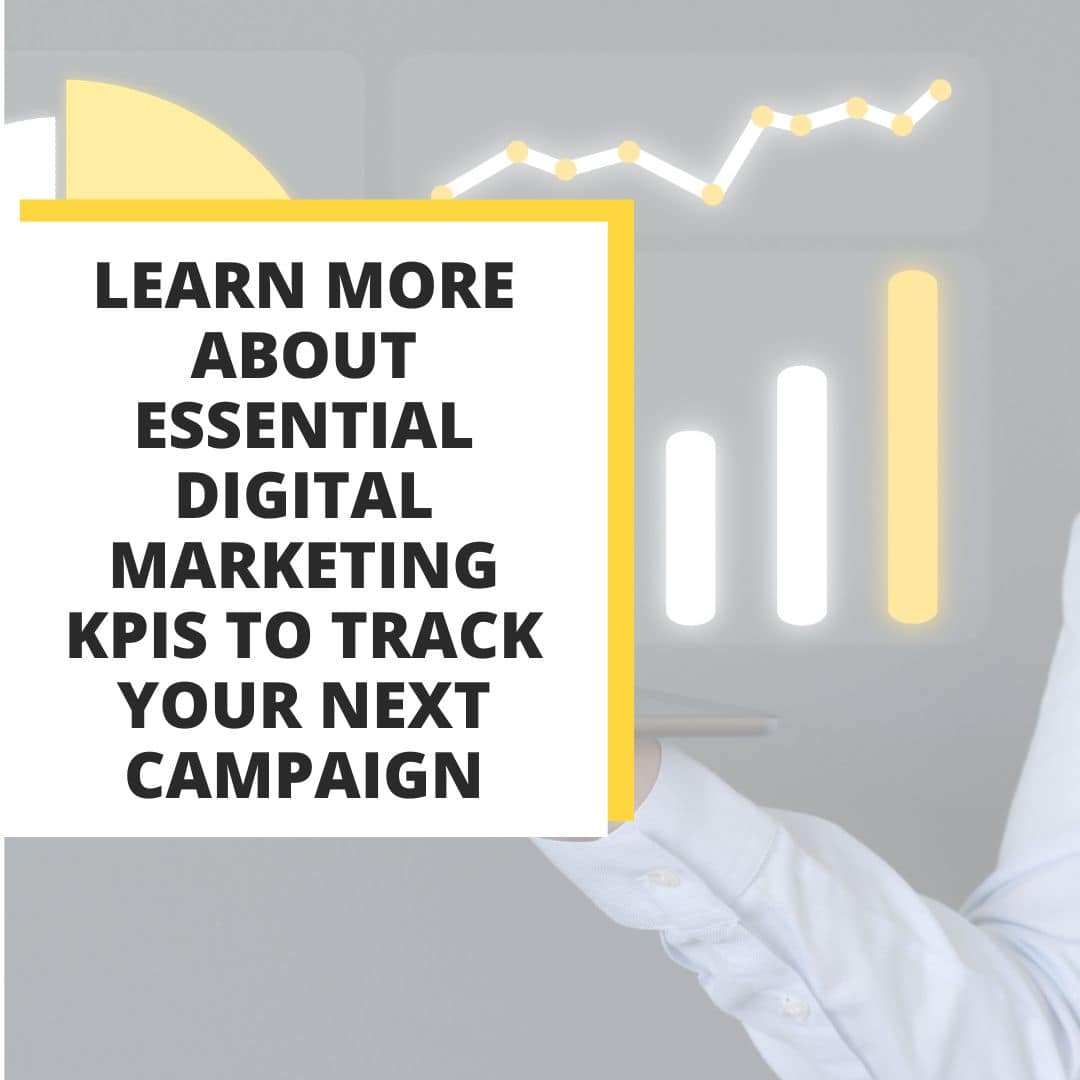Learn more about Essential Digital Marketing KPIs To Track In Your Next Campaign

Choosing the right digital marketing KPIs, then, is a critical first step in terms of measuring the return on investment of your various marketing efforts. From SEO to bounce rate, customer lifetime value, marketing ROI, customer acquisition cost, click-through rate (CTR), and many more, we asked several of our key partners and experts in various marketing activities to offer their thoughts on the essential key performance indicators for your digital marketing in 2022 and beyond.

Nowadays, there are more metrics than ever that marketers can use to track and measure the effectiveness of their marketing campaigns or broader marketing efforts. Choosing the right digital marketing KPIs, then, is a critical first step in terms of measuring the return on investment of your various marketing efforts. From SEO to bounce rate, customer lifetime value, marketing ROI, customer acquisition cost, click-through rate (CTR), and many more, we asked several of our key partners and experts in various marketing activities to offer their thoughts on the essential key performance indicators for your digital marketing in 2022 and beyond.
Importance Of Choosing The Right KPIs For Your Marketing Goals
Our panel consisted of experts from several fields, including marketing strategy, social media, PPC, SEO, email marketing, and numerous other digital marketing categories. And most of them started their KPI advice for 2022 (and many years to come) by pointing out the importance of setting goals for your digital marketing metrics before you began measuring and analyzing the results.
“One of the most important things to consider when tracking and measuring KPIs is how clear goals and objectives are to the entire process. Without a clear sense of what you want to achieve, it will be difficult to properly interpret the data. And KPIs should be used in conjunction with other data points to get a complete picture of your marketing efforts.” – Natalia Osorio Quintero, Digital Marketer at NataliaOQ
There can be as many KPIs and metrics as there are types of marketing collateral and outlets. If lead generation is your goal, for example, there may be different measures that help paint a clear picture of your campaign success than those you’d use if retention rate or brand awareness is the goal. Regardless of the specific goals, you have for your marketing investment, clearly establishing your goals will often dictate the right mix of KPIs and measures of success.
“A business can’t accurately assess whether a marketing investment was viable or wise if there isn’t an observable benchmark for what kind of dent the campaign made for them. The right KPIs, collaboratively established during discovery, quickly and succinctly give business owners a clearer picture of the campaign so they can observe growth, then scale or pivot if things aren’t converting as they want.”
– Max Zoghbi, Founder & Creative Director at Loupe Theory
“Campaign success, while generally subjective, is based on whether or not a brand can meet or exceed its goals. KPIs are put in place to measure progress, hence the term. They’re meant to be adjusted over time.”
– Ceara Milligan, Social Media Manager at STIR Advertising and Integrated Messaging
And while your organization may tweak the important digital marketing KPIs that you set for your campaign, the types of campaigns you plan to run will help you narrow down the list of important metrics that matter.
“It depends on the type of campaign you are running. For search engine optimization campaigns, it is important to measure the site health, organic keywords, organic keyword position, organic traffic, keyword ranking position, and so on. For ads, you want to know the impressions, clicks, conversions, and cost per conversion. And these are just two examples of how different KPIs vary depending on your campaign type.”
– Masha Kaprian, Principal at iMedPages, LLC
While different types of campaigns and marketing channels can have different goals, businesses still need to drive revenue. And measuring digital marketing KPIs for any kind of campaign will tell you exactly what’s working, what isn’t, and where you can make changes that strengthen your campaign.
“Even if the main goal of a campaign is not sales or conversions, the ultimate goal of any business is to make enough money. The ad can be beautiful, the landing page can be breathtaking, and the copy can be engaging, but if new customers and established customers are not taking the action you want them to take, the campaign is not generating the results you need.”
– Blake Nolan, Founder & Chief Operating Officer at Storm Brain
“Everything can be measured, whether it be phone calls, emails, form fills, account signups, app downloads, product sales, and cart abandonment. But many businesses and agencies are only reporting on total-number site metrics such as time on site, page views, new users, and so on. Proper conversion mapping will not only showcase real-time results (including customer engagement and sales), it will also show lost revenue opportunities and areas where conversion rate can be improved.”
– Dave Taylor, Cofounder of In Front Marketing
In addition, measuring your digital marketing campaign goals is important not because it will point out failings, but because they tell you about the opportunities that exist and ways that you can improve performance.
“KPIs should come with goals that you want to reach. That will ultimately tell you whether or not your campaign is a success. But if you do not meet your goals, that does not mean your campaign is a total failure. Rather, it shows that you have an opportunity to continue to improve your campaigns, so next time you run a campaign you know to make small tweaks that can lead to incremental improvements.” –
Nick Mattar, Founder, and CEO at Digital Detroit LLC
Specific Digital Marketing KPIs And Metrics To Consider In Your Marketing Campaigns
As you can see, our experts agreed that goals will play a huge factor in determining which KPIs matter the most. Just like your digital marketing strategy overall, choosing the right measures of success requires spending some time evaluating what your metrics for achievement are. From there, however, many of the panelists and marketing experts did have specific recommendations for the key marketing metrics and measures to consider for your current and upcoming campaigns.
“Start with Customer Lifetime Value. CLV will dictate which prospects you should be focusing your campaigns on. From there you can move on to tactical KPI metrics, such as Return on Ad Spend (RoAS) and Cost Per Acquisition (CPA). CLV is key guidance in regards to determining who your campaigns should be targeting, while RoAS and CPA will empower you to judge the effectiveness of the campaigns.” – Alonzo Foreman, SVP of Marketing at OppGen Marketing
Measuring the effectiveness of channels was a key takeaway from our conversations with marketing leaders and digital experts, as it fed into several other metrics and it can help determine the best places to increase or decrease spending.
“Two metrics that help determine which channels are most effective are ROAS (return on ad spend) and CAC (cost of acquiring a customer). These metrics help us determine the LTV, or lifetime value, of a customer. Since we know how much it costs to acquire them, we can measure that against the average life of a customer or how much a customer spends with us. This helps us know how profitable each channel is.” – Nicole Denson, Marketing Manager at Big Leap
Just as was the case with our discussion of goals above, your KPIs are very dependent on what you want your campaign to achieve, and what you consider to be a measure of success. Ecommerce campaigns will undoubtedly call for different metrics than a brand awareness campaign, for example.
“From an SEO firm’s perspective, two primary KPIs to track in a digital marketing campaign include search engine keyword rankings and organic website traffic. If a company is executing a sound on-page optimization strategy, complete with value-add SEO tags that align with relevant industry terms and detailed, long-form content on landing pages, these factors can help improve search engine rankings.” – Asad Kausar, CEO at Dabaran Inc.
“I think that link CTR, CPA, and CPM are three of the most critical metrics to track in all digital campaigns. Your link CTR is the gauge that allows you to truly see if your creativity and messaging align with your market. Your cost per acquisition will help you determine if your campaigns are profitable and worth running depending on what a client is worth to you. Finally, your CPMs can help dictate if you have a fair bid in your advertising campaigns.” – Ashley Monk, CEO of Onya
With many different options and different places to start, the metrics you choose to track most closely may shift and change as you continue to develop and implement new campaigns. But certain measures provide anyone with a solid assessment of how your marketing campaign is impacting your business goals.
“Total revenue and average conversion rate can act as the anchor of your marketing initiatives. When doing A/B testing, a simple comparison of these macro metrics will spotlight which campaigns performed better overall. It’s essential to track, define your goals, and build them out in your preferred analytics system.” – Edan Ben-Atar, Founder of WebLime
“Website traffic and lead-to-visitor conversion rates are two of the most important KPIs for digital marketing campaigns. It’s important to have a healthy mix of new and returning site visitors, as well as to make sure that the traffic we are driving is relevant traffic based on search intent and keyword targeting. And while website traffic on its own is a great metric, it only tells half the story. If you are seeing an increase in site visits but not an increase in conversions, this could mean that some adjustments need to be made.” – Ashley Ismailovski, CRO & Operations Manager at SmartSites
“My top nine most important and most essential KPIs that every digital marketer should use to measure the success of their campaigns are: Web Traffic Sources; Leads; Page Views; Cost per Lead; Returning Users; Conversion; Goal Completion Rate; Click-Through Rate; and Customer Acquisition Cost.” – Joe Smith, SEO Expert at Market Media Connect
Some of the most valuable metrics for your campaign may not be strictly numerical, too. There are some insights that you may not get from Google Analytics, but which are incredibly important for helping you see how well your marketing budget is being put to use.
“Lead sources. You should investigate the source of your sales. This is one of the most crucial marketing KPIs for your company’s long-term success. If all of your leads originate from one source, a server outage or a store closing could be disastrous for your business. Diversifying your lead sources now may help secure your business in the future.” – Luca Tagliaferro, SEO Consultant at Luca Tagliaferro SEO Consultancy
“Qualified website traffic (or qualified leads) is always a primary KPI for any online campaign. This metric measures the number of website visitors (and potential customers) that result from your marketing efforts. By tracking website traffic, you can gauge the overall reach of your campaign and compare it with other marketing initiatives.” – Andre Kay, CEO at Sociallybuzz
And the quality of your leads, if that’s one of the metrics you choose, is even more informative than the raw number of people who found your site or the number of leads your form generated.
“Consider Profit Per Action rather than cost per action. Cheap leads are not guaranteed good leads. To assess the performance of a campaign, we should be looking at how much profit the campaign is bringing in, instead of focusing on the raw number of leads.” – Justin Chan, Senior Business Developer at Coding Bull Web Redesign Agency
“When looking at conversion rate, it is helpful to look at how many actions were real leads and not just bots or spammers. We look at where traffic is coming from, which pages they are taking action on, and what types of action are most often taken (e.g. phone calls, contact form submissions, email sign-up, etc.).” – Charity Maddox, Owner of Carve Digital Marketing
Finding Out How Your
Campaign Measures Up
Whether you’re launching an organic search effort, upping your content marketing game, or simply ramping up your social media efforts, the bottom line is that you need to be able to see your marketing performance in terms of what’s working and what isn’t, and then adjust with that information in hand. Our experts here have provided some great examples of key metrics and KPIs for you to begin your planning and strategy with, but this is only the beginning. Whether you need help with an inbound marketing campaign, lead conversion, or any other digital marketing and analysis project, our group of expert digital marketing partners is available to help you make the most of your marketing spend and see the results.



